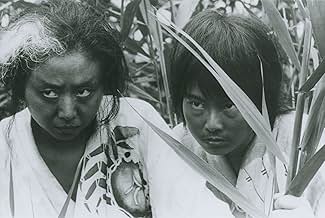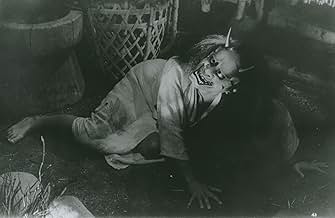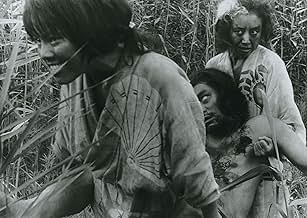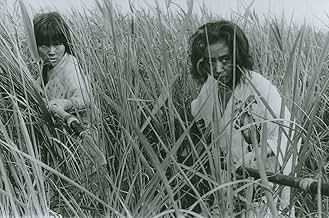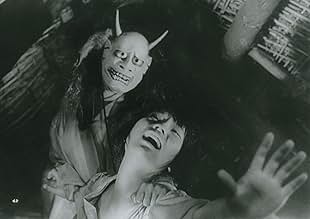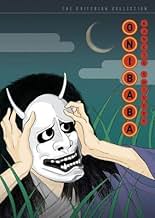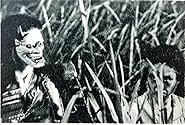Two women kill samurai and sell their belongings for a living. While one of them is having an affair with their neighbor, the other woman meets a mysterious samurai wearing a bizarre mask.Two women kill samurai and sell their belongings for a living. While one of them is having an affair with their neighbor, the other woman meets a mysterious samurai wearing a bizarre mask.Two women kill samurai and sell their belongings for a living. While one of them is having an affair with their neighbor, the other woman meets a mysterious samurai wearing a bizarre mask.
- Awards
- 2 wins total
- Director
- Writer
- All cast & crew
- Production, box office & more at IMDbPro
Featured reviews
Wow,I saw this movie on Cable recently.Both of the women in this story are just trying their best to get by and survive in a bad situation.I could tell it was on a limited budget but very well written.It was erotic with frontal nudity and even filmed in the 60's.It had me on the edge of my seat the whole time.I was trying to figure out where they were going with the whole thing.I kept trying to decide if I sympathized with the old woman more than the young one.Then at the end I felt sorry for both of them.What a great story.This one needs to be on Cable more often.This one is a must see even for people who only like contemporary films.I would recommend it to anyone.
Set during a very dark time of war,where weapons and food are the items of barter due to their scarceness, which sees two different Emperors on the throne of Japan and Kyoto destroyed by fire
.our story is that of a Mother and her Daughterin-law who have been left on their own to fend for themselves while the son/husband of our main protagonists is away at war
.The Mother and daughter duo take care of themselves by killing any stray Samurai/warrior that passes their way and stripping them of their armour and weapons which they then trade for millet from the unscrupulous Ushi. One night Hachi a neighbour who had been at war with the missing Husband/son arrives at their hut in a very bedraggled state and tells them of his untimely death.The women are distraught
..Hachi has made his intentions clear he wants the daughter-in-Law as his woman
The Mother afraid of being left alone warns the daughter off
.The ensuing drama is a tale of their sexual tension in the high summer heat, which is exemplified by the swaying of the reeds/grass, the faster the reeds blow in the wind the higher the sexual tension .The mother plays on the fears of the daughter by telling her tales of Demons who prey on those who do wrong
.the wrong being sex outside of marriage, but this is just a smokescreen as the mother throws herself at Hachi and asks him to sleep with her
Hachi refuses, this is the final straw for the mother.The mother meets a Samurai General who is lost in the reeds, she kills him and takes the very scary Demon mask which he wore and wears it herself each night to scare the daughter when the daughter sneaks out for her nightly fix of lust with Hachi. This a very technically proficient film, not really a horror film until arguably the films last quarter
..it has surprisingly a lot of nudity which is not intrusive but is put there by Shindo to show that nudity is not really an issue for someone who has to kill every day just to survive. Shindo also uses Black and White to stunning effect at a time when it was probably easier to film in colour
..this is not a horror masterpiece
This is a Cinematic Masterpiece!
Director Kaneto Shindo's ONIBABA is a fantastic, rich, atmospheric horror film set in an amazing rural location. Its influence on decades of rural-set genre pics is undeniable.
In a medieval, warring Japan, a wild, young woman and her mother-in-law rob and kill lost samurai in order to survive. Problems begin when the younger woman becomes involved with an intended victim.
Staged in a rural world of tall, swaying grass and swollen rivers, the film contains little dialogue and little exposition. It relies heavily on the non-verbal performances of the female leads and the superbly conveyed location.
It is erotic, creepy, sensual, savage and beautiful.
Cinematic poetry.
In a medieval, warring Japan, a wild, young woman and her mother-in-law rob and kill lost samurai in order to survive. Problems begin when the younger woman becomes involved with an intended victim.
Staged in a rural world of tall, swaying grass and swollen rivers, the film contains little dialogue and little exposition. It relies heavily on the non-verbal performances of the female leads and the superbly conveyed location.
It is erotic, creepy, sensual, savage and beautiful.
Cinematic poetry.
Life's been tough, and you're surviving on the edge, trapping Samurai from flows in which you dredge, your often empty skillet, is sometimes, filled with millet, but at least your daughter in law helps you fetch. A neighbour returns home, with some bad news, your son, fallen in battle, no longer moves, it's not long before his wife, is causing stress, struggle and strife, behaving in a way you wholly disapprove. By fortune, you obtain a Hannya Mask, it comes in handy for a demonising task, a barrier of sorts, daughter in law's trips cut short, but there's no time to enjoy pleasures, or to bask.
Nobuko Otowa provides us with a truly outstanding performance as she grapples with her daughter in law's infidelity after the loss of her husband, leaving her isolated, alone and forgotten. The cinematography is sublime, the raw emotions unrefined, and the mask a cursed damnation that sticks and binds.
Nobuko Otowa provides us with a truly outstanding performance as she grapples with her daughter in law's infidelity after the loss of her husband, leaving her isolated, alone and forgotten. The cinematography is sublime, the raw emotions unrefined, and the mask a cursed damnation that sticks and binds.
Onibaba is a very well done film, purposefully using black and white cinema to its' advantage in this stunning portrayal of murder, jealousy, and uncontrollable human instinct in a dark period of Japan's history.
A film that aims at portraying the baser side of human nature and investigating human psychology, it is chalk-full of symbolic scenes and sequences. From start to finish it draws you in with the odd imagery and scenery of Japan's rural areas, and even though in this film though there are very few characters and elements that are to it, both visually and literally, through its' minimalism it effectively tells its' story.
This film is both very artistic & symbolic as well as literal and upfront, juxtaposing very graphic, real images of the face of humanity that demand the viewer to infer much throughout the whole of the film. When going into this film, I would say that it is very important for the viewer to think of the film as being very symbolic for the instincts and base nature of mankind, and perhaps even a 'state of nature' portrayal of humanity. If you watch this film with that in mind, it will help with the inferences that one must make to get the most out of this film.
As it stands by itself, aside from the deeper meaning, it is an intriguing story that is a veritable 'slice of life' film in the darker sense, viewing the way that people had to live during a period of war and hard times in feudal Japan. It deals with the hardships that these people face, and their method of survival, in addition to a very human story of jealousy and portrayal with a very interesting culminating point that I did not expect at all. The climax of the film is very much worth the build-up, though at times it seemed to be rather slow.
Overall, a very important piece of film when it comes to the symbolism and techniques employed. Through its' minimalism and black-and-white cinematography we are really treated to a great film that is, of its' own right, an influential and great movie. The cinematography is exceptionally good, especially the use of the reeds and the light at night.
I would recommend this film to anybody with a serious interest in film, as well as anybody who likes a good film that investigates the darker side of human nature.
A film that aims at portraying the baser side of human nature and investigating human psychology, it is chalk-full of symbolic scenes and sequences. From start to finish it draws you in with the odd imagery and scenery of Japan's rural areas, and even though in this film though there are very few characters and elements that are to it, both visually and literally, through its' minimalism it effectively tells its' story.
This film is both very artistic & symbolic as well as literal and upfront, juxtaposing very graphic, real images of the face of humanity that demand the viewer to infer much throughout the whole of the film. When going into this film, I would say that it is very important for the viewer to think of the film as being very symbolic for the instincts and base nature of mankind, and perhaps even a 'state of nature' portrayal of humanity. If you watch this film with that in mind, it will help with the inferences that one must make to get the most out of this film.
As it stands by itself, aside from the deeper meaning, it is an intriguing story that is a veritable 'slice of life' film in the darker sense, viewing the way that people had to live during a period of war and hard times in feudal Japan. It deals with the hardships that these people face, and their method of survival, in addition to a very human story of jealousy and portrayal with a very interesting culminating point that I did not expect at all. The climax of the film is very much worth the build-up, though at times it seemed to be rather slow.
Overall, a very important piece of film when it comes to the symbolism and techniques employed. Through its' minimalism and black-and-white cinematography we are really treated to a great film that is, of its' own right, an influential and great movie. The cinematography is exceptionally good, especially the use of the reeds and the light at night.
I would recommend this film to anybody with a serious interest in film, as well as anybody who likes a good film that investigates the darker side of human nature.
Did you know
- TriviaOnibaba's literal meaning is demon hag or old devil woman.
- GoofsWhen the two soldiers get off their horses and start fighting in the river, the audio of the water splashing goes on and off. In addition, when the swords clash, there is no sound of clanging heard.
- Alternate versionsOriginally cut in England when released in 1968, though the video releases are uncut.
- How long is Onibaba?Powered by Alexa
Details
Box office
- Gross worldwide
- $689
- Runtime
- 1h 43m(103 min)
- Color
- Sound mix
- Aspect ratio
- 2.35 : 1
Contribute to this page
Suggest an edit or add missing content


